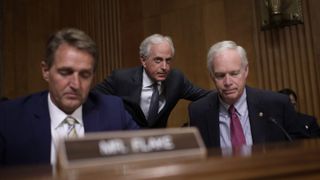There’s been much ado about the absence of a US Ambassador to Australia.
While the 11th hour re-routing of Harry Harris to Seoul captured attention, the underlying issue is that it will be many months yet before a Senate-confirmed nominee moves into the Ambassador’s residence in Yarralumla.
Ambassadorial absenteeism should not prompt undue panic. Charge D’Affaires Jim Carouso has been at the helm of the US Embassy for 18 months and is highly respected by Australian politicians and bureaucrats.
Ambassadorial absenteeism should not prompt undue panic. Charge D’Affaires Jim Carouso has been at the helm of the US Embassy for 18 months and is highly respected by Australian politicians and bureaucrats. Moreover, new Secretary of State Mike Pompeo is at this stage both trusted by President Trump and re-invigorating State, which will help Carouso and the embassy cut through in Washington.
But a well-qualified ambassador should be chosen as soon as possible to demonstrate the Trump Administration’s commitment to the US-Australia alliance.
This is a hard task, because there are simply no obvious candidates for the role. The Trump administration has four broad categories from which to choose an ambassador: i) a politician, ii) a presidential friend, business executive or campaign donor, iii) a military figure, or iv) a civilian foreign policy professional.
Trump’s team seems to be fishing in the first pond, eager to put a prominent politician in Canberra after the Harris about-face. The two most qualified retiring Republican senators, Foreign Relations chairman Bob Corker and Finance chairman Orrin Hatch, are not interested in the role, with Hatch’s spokesperson offering the rather colourful appraisal that the 84-year-old Utahn looked forward to “retirement filled with early bird specials at all-you-can-eat buffets and long walks through Costco”.
Three retiring members of Congress might be in the mix: Arizona Senator Jeff Flake, and the current and immediate past chairs of the House Foreign Affairs Committee, Ed Royce and Ileana Ros-Lehtinen. Yet each has characteristics likely to prevent either an approach by the Trump administration, or their acceptance of an ambassadorial offer. Flake and Ros-Lehtinen have both been Trump critics, while Royce’s wife is an assistant secretary at the State Department, based in Washington, D.C.
If recent history is anything to go by, the next ambassador will be a presidential friend, businessman or campaign donor.
A politician would be an unusual choice – the only person to leave Congress to serve as ambassador to Australia was Pete Jarman, a six-term Alabama representative who in 1949 traded Washington and the Deep South for Canberra.
If recent history is anything to go by, the next ambassador will be a presidential friend, businessman or campaign donor. Republican presidents have form: George W. Bush chose two lawyers and business associates as his ambassadors, his father a campaign donor, and Ronald Reagan’s second ambassador Bill Lane was a magazine owner and horse-riding buddy. The Trump administration has nominated this type of ambassador for US allies and partners as significant as Israel, the United Kingdom, France and Japan – but Canberra isn’t Paris or Tokyo.
Military figures may be under consideration for the role, such as Scott Swift, the outgoing Pacific Fleet Commander, but it is unclear if he wants to move to Canberra. And, regardless of President Trump’s affinity for generals, he has nominated few military figures – except Harris – to serve as ambassadors.
A civilian foreign policy professional might seem a logical choice. The obvious option would be to upgrade Carouso to the ambassadorship (which would still require Senate confirmation). But this has been possible since the Trump administration took office in January 2017, and was presumably canvassed after the Harris withdrawal. The more reports emerge that people like Corker and Hatch are not interested in the role, the less likely the ‘Carouso option’.
Other critical factors are working against expert ambassadorial aspirants. The Trump administration has nominated only a handful of career State Department officials and highly-qualified outsiders to top posts. So long as President Trump remains adamantly opposed to the ‘Never Trumpers’, we can rule out the Bush administration alumni – such as Michael Green, Richard Fontaine, Dan Blumenthal and Patrick Cronin – who know Australia well.
In the ambassadorial sweepstakes, it’s not easy to pick the winner.






